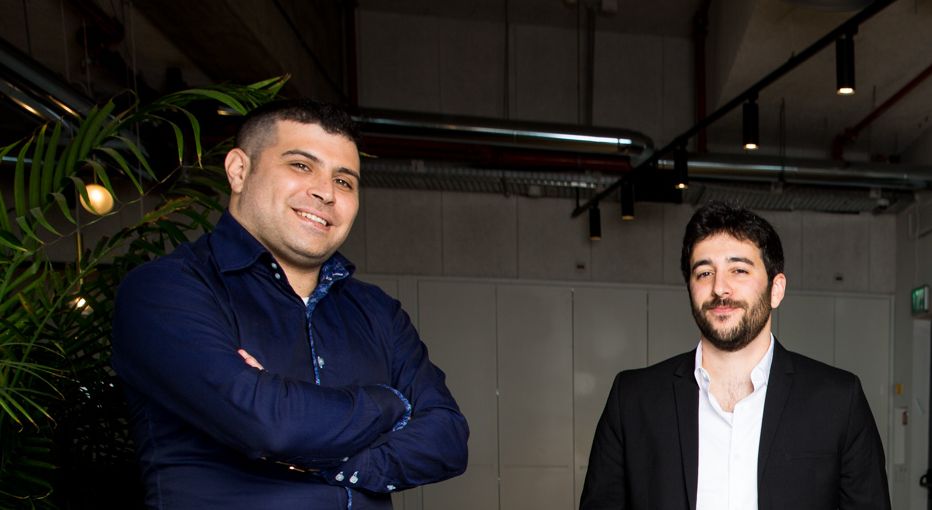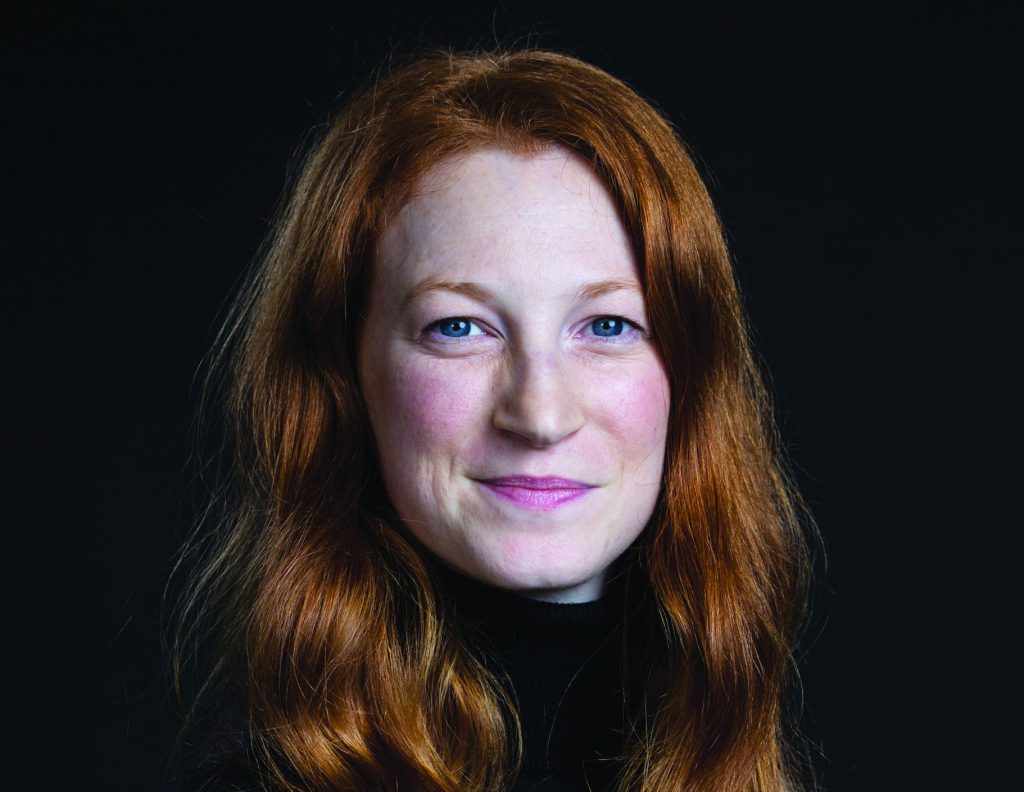Yonatan Amir stood, on a Friday morning in a tailored suit, on the 60th floor of Sarona Azrieli Tower in Tel Aviv and, with a shy smile spoke with Omri Moyal Segev, a young entrepreneur who he had met the same day about his new startup Diagnostics Robotics. “We believe in the working together of machine and human physician,” he told his impressed colleague in an attempt to summarize the Company’s business: helping physicians and caretakers make faster, more accurate diagnostic decisions using artificial intelligence tools.
The article appears in the April 2020 issue of Forbes Israel. To purchase the issue, click here.
This meeting took place at the photoshoot of the Forbes Under30 project last year. Amir (32) didn’t imagine that less than a year and a half later, his Company would look completely different.

It all started in March. Amir, the CEO of the Company, and his partners, researcher Dr. Kira Radinsky and Professor Moshe Shoham (founder of Mazor Robotics), began to hear news about the spread of a new virus in Asia. But not only did the virus spread like wildfire – so did the hysteria. The world’s attention very quickly turned in one direction only – Corona. “Our clients are healthcare organizations all over the world, and very quickly, everything that was unrelated to Corona became a low priority and frozen,” relates Amir.
Huge Potential
Very quickly, the Company found itself in an impossible situation. Projects were frozen, and work with remaining customers became very difficult. “We found ourselves in a technical and technological situation where we could not get to our offices and run integrations for our customers,” he says. But it was precisely these two difficulties that led Amir and his partners to understand the enormous potential in front of them, created by the unique and extreme conditions that developed.
“We realized that there was a great need in the market for Corona monitoring technologies, and realized that, actually, over the past two and a half years, we have developed all the building blocks needed for such a system – smart dashboards for patients and physicians, integration systems for different kinds of data in healthcare organizations, the ability to produce recommendations and future forecasts. All we had to do was reassemble the blocks,” explains Amir.
Yonatan Amir: “There’s a level of openness that exists only in Israel – you can call or send a message to any CEO or any company, and a lot of people will be happy to help.”
“The sector that the Company belongs to (artificial intelligence in healthcare) connects to trends that are about to accelerate in the world, such as home deliveries, food deliveries, video calls, use of telemedicine. All of these things are, as it is, part of the vision of the Company, so we simply started doing everything within the model of remote deployment and remote working. We made the technological and business switch.”
This switch saved the Company. Today, Diagnostic Robotics, which operates in Tel Aviv, employs about 100 workers, including 30 doctors, scientists, and engineers from the world’s leading research and development groups.
“Everything has completely exploded in the last month and a half,” says Amir. “From being in a state of freezing the Company or laying off employees, we have reached a situation where, a mere month and a half later, we are globally deployed, with dozens of new customers and we’ve reached tens of millions of users.
We are in the process of recruiting dozens of employees to support all the operations in Israel and globally that emerged from the crisis. At the management level, this is the best decision I have made and the one I am proudest of”.
Blooming in the Spring
According to Amir, in Israel, there are a large number of young and small startups that collapsed because of the crisis. Mid-size startups have cut 40% – 30% of their workforce. “For a young startup, it’s a situation you can’t come back from.”
“Inevitably, many of the young or older companies will not succeed in getting through the crisis,” adds Amir’s colleague, Omri Segev Moyal, who previously founded the cyber company MinervaLabs and currently heads up Profero, another company operating within the field of cyber.

Nevertheless, quite a few startups have found their niche in recent months and actually, during one of the severest crises in recent decades, began to blossom.
“I think it’s a very powerful characteristic of Israeli startups, of the Israeli entrepreneur,” says Amir. “We know how to adapt and work very well in times of crisis. We bloom in chaos”.
How much are they blooming? With the onset of the crisis in Israel, the Innovation Authority, in collaboration with the Ministry of Health and Digital Israel, published an open call for startups and companies to develop systems, products, and technological solutions to address the challenges of the Corona epidemic. According to Aharon Aharon, CEO of the Innovation Authority, within just a week they received about 900 applications in various focus areas – from solutions that increase the capacity of respiratory intensive care units to solutions aimed at supporting the elderly and special populations.
Mapping the Spread
The niche that Robotics Diagnostics entered is the mapping of the spread of the virus. They created a next-generation system, which produces a dynamic map. It diagnoses patients remotely, even before arrival and meeting with medical staff, and allows for the prediction of outbreaks.
The system is based on a questionnaire compiled by the Ministry of Health, with the assistance of a wide panel of experts who volunteered to help. The general public was asked to fill out the questionnaire on a daily basis, which includes general questions about one’s residence and general health, as well as the development of symptoms.
“Individuals providing their symptoms on a daily basis produces a smart epidemiological map,” explains Amir. “You get a picture of the current state of the virus in the country.” This snapshot allows you to predict what is going to happen in the coming days. “Together with individual citizens, in an anonymous and voluntary way, we enhance and enrich the predictive power of Israeli decision-makers.”
According to Amir, the Company contacted the Ministry of Health and offered its entire suite of services free of charge. “Today we provide the system at no cost to MADA (Israel’s emergency services), hospitals, healthcare providers, and all the patients in Israel.”
The Company is already working on another system to be launched in the coming days – a nationwide triage system. Individuals who want medical professionals to contact them will be able to subscribe to the service, undergo a thorough symptomatic questioning, and ultimately, the MADA team and staff at healthcare providers will receive a clinical overview of the patient, with an analysis based on artificial intelligence, including red flags regarding life-threatening situations.
The Community Mobilized
For Omri Segev Moyal too, the recent period was particularly turbulent. Until a few months ago, he was still working, together with his partner Guy Barnhart Magen, a former cyber researcher at Intel, to recruit for a new startup they were working on. Then the first news began to come from China, and the two realized that something out of the ordinary was about to unfold. They decided to put aside their old plans, put all their efforts into their cyber company Profero and prepare it for the coming crisis.
Segev Omri Moyal: “If in the past, in times of crisis or pandemic, people would take to the streets to loot – today, in 2020 it has become “technological looting,” and we can see a trend of a very sharp increase in cyber-attacks.”
“The need for cyber services has increased because a lot of people have moved to work from home,” says Segev Moyal. “You see a very big increase in attacks. If in the past, in times of crisis or pandemic, people would take to the streets to loot – today, in 2020 it has become “technological looting,” and we can see a trend of a very sharp increase in cyber-attacks, especially from China”.
At the beginning of the crisis there was a cyberattack against an application launched by the Ministry of Health, CoronApp. Segev Moyal was called upon to repair the damage, and the office was pleased with the fast and efficient work. Thus the connection that led to the launch of one of the talked-about apps of the Corona era – the Magen (the shield) app, was created. The app, which allows subscribers to find out whether they crossed paths with verified corona patients, reached a million and a half users within a very short amount of time.
Quite a few entities took part in this project. Moyal was in charge of security, the company Matrix with development, and the Israel Ministry of Defence – Directorate of Defence Research & Development (IMOD DDR&D) were also in the picture. “Our teams, which deal with cyber every day, stopped their work and moved on to developing the Magen app,” says another graduate of Forbes Under30, Neta Blum, normally the Head of the Flight Technologies Department at the IMOD DDR&D, and these days, in charge of the team mapping the gaps in the fight against Corona and coordinating innovation in the field.

Full Cooperation
“They wanted to circulate the app, but even the Q&A team at the Ministry of Health refused to install it on their mobile phones because they were afraid and thought it was connected to the surveillance and location tracking by the Shin Bet,” recounts Segev Moyal.
“So the office realized that there was a problem, that they have terrible branding. They turned to us for help – first to investigate the app, to check that it was not collecting information and passing it on to the government, and of course, that it was secure, that it could not be hacked into and that it could be sent as quickly as possible to as many people as possible.
“We took this project on because we really wanted to help, and also because there was full cooperation from the Ministry of Health and innovative thinking on their part. They agreed that the app would protect privacy, not like a standard app that steals information, and also that it would be released in open source, which has not been done before by the government,” he says.
“It’s very nice to see how the government is trying to innovate and renew, and we’ve pretty much wet their appetite for open source work.” According to him, this has great significance. “Location history, with Google, for example, was added to the app through their work with open-source. This addition was contributed by the cyber community, which, without the open-source aspect, would not trust the system and the Ministry of Health. They saved weeks and months of development”.
Waiting for the Next Wave
The Corona crisis presented the “Startup Nation” with a tough challenge, and it seems as though the entire technological ecosystem came to life and answered the call. Among other things, under the auspices of the security agencies, who have now turned their resources and attention to the civilian environment. “We have become national providers of technological and productive solutions for everyone who needs it – hospitals, the Ministry of Health and other entities, and we strive to integrate into every area in which we can help,” says Blum.
“We harnessed all the security and civilian players for the effort: the IDF, the Mossad, the National Insurance Headquarters, the Ministry of Health, Ministry of Finance, Ministry of Economy, the Innovation Authority, universities, security and civil industries, and startup founders to accomplish the task. Everyone is looking at Israel. I returned from a business trip in the United States before the epidemic outbreak. Towards the end of the visit, Corona began to spread, and everyone I met during the trip said – ‘Israel will bring the gospel.'”
Neta Blum, IMOD DDR&D:” I returned from a business trip in the United States before the epidemic outbreak. Towards the end of the visit, corona began to spread, and everyone I met during the trip said – ‘Israel will bring the gospel.'”
Interest in solutions coming out of Israel is also felt by Amir and Moyal, who is currently advising several governments, including the Italian government. Amir says that the Diagnostic Robotics system has already been presented to a special team at the White House responsible for curbing the spread of the virus.
“We have received a series of inquiries from around the world, and in the last few weeks we began global deployment. The system is going live in India, after joining several governments and leading health agencies in the world, and in cooperation with Salesforce and Deloitte. All in all, 100 million patients have access to our systems worldwide”.
“There is also red tape”
But not everything is rosy. According to Moyal, despite the Startup Nation branding, ultimately, some of the developments “are relatively standard, there are apps that are similar to the Magen app in the United States, Singapore, and Europe as well.”.
He said that despite the engagement of various bodies to manage the technological structure, there is quite a bit of red tape. “We don’t really take advantage of the capabilities in the country. There is potential, but it has not been realized as it should. From my personal experience, in various government offices, there are frictions and no collaborative work. If there were a government before, maybe the situation would have been better”.
One thing they all agree on – we must begin and get ready right away for the next wave and the future crises that are certain to come sooner or later. “We need to invest in medical technologies like we invest in cyber,” says Segev Moyal, “and also in collaborations between the state and the corporate side.”
Amir also connects to this. “Joint discussions between the systems need to be strengthened,” he says. “We speak daily with decision-makers in the Ministry of Health, and our strength as a nation and as Startup Nation comes from a shared thought process and conversations between people from every industry – from government ministries, IMOD DDR&D, the Israeli Defense Force (IDF), and more.”
“Ultimately, at the level of the local startup industry, there is a reason why there has been a critical mass of companies that have reached unicorn-level valuations. We manage to cultivate lots of successful startups at a fast pace, because there is a reel of knowledge that rolls from entrepreneur to entrepreneur, from company to company. There’s a level of openness that exists only in Israel – you can call or send a message to every CEO or any company, and a lot of people will be happy to help in many fields. Sharing knowledge is our greatest asset, and it is what is unique to the State of Israel. If we maintain open communication between us, we’ll protect the local industry and our resilience ahead of the next epidemic.”




